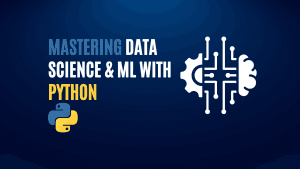Introduction
Machine Learning (ML) has revolutionized industries by enabling systems to learn and make decisions from data. Despite its immense potential, practitioners face numerous challenges that hinder the development of effective models. This article delves into common machine learning challenges and offers strategies to overcome them.
Ready to take you Data Science and Machine Learning skills to the next level? Check out our comprehensive Mastering Data Science and ML with Python course.
Data Quality Issues
One of the foundational challenges in machine learning is ensuring data quality. Poor-quality data leads to inaccurate models and unreliable predictions.
Incomplete Data
Incomplete datasets are common, leading to gaps in information that can skew results. Strategies such as data imputation or using algorithms robust to missing data are essential.
Noisy Data
Noisy data includes errors and inconsistencies that can disrupt the learning process. Techniques like data cleaning and outlier detection help minimize the impact of noise.
Data Imbalance
Data imbalance occurs when certain classes are underrepresented, leading to biased models. This can be addressed by techniques like resampling, synthetic data generation, or cost-sensitive learning.
Ready to take your data analysis skills to the next level? Check out our comprehensive Python for Data Science Course!
Complexity of Learning Models
Building models that generalize well requires balancing complexity with interpretability.
Overfitting and Underfitting
Overfitting happens when a model learns noise instead of the signal, while underfitting occurs when it fails to capture the underlying trend. Regularization techniques and cross-validation help in finding the right balance.
Model Interpretability
As models become more complex, they often become less interpretable, making it difficult to understand their decisions. Explainable AI techniques and simpler models are sometimes preferred to ensure transparency.
Algorithm Selection
Choosing the right algorithm is critical. Understanding the problem domain and the nature of the data can guide this decision, but experimentation is often required.
Data Processing Challenges
Efficient data processing is crucial for building robust models.
Data Preprocessing Techniques
Data preprocessing is the first step in any ML project. It involves cleaning, transforming, and standardizing data, which can be a time-consuming but necessary process.
Feature Engineering
Creating relevant features from raw data can significantly improve model performance. This step requires domain knowledge and creativity.
Algorithm Complexity
Complex algorithms often require significant computational resources.
Computational Costs
High computational costs can limit the feasibility of certain models. Optimizing algorithms and using efficient hardware can help mitigate these costs.
Scalability Issues
Scalability is a concern as data grows in volume. Distributed computing and cloud-based solutions are often employed to handle large datasets.
Model Optimization
Optimizing models involves tuning hyperparameters and selecting the best-performing algorithms. This process can be automated using techniques like grid search or Bayesian optimization.
Data Bias and Ethical Concerns
Ethical considerations are increasingly important in ML.
Types of Data Bias
Data bias can stem from various sources, including sampling bias, measurement bias, and algorithmic bias. Recognizing these biases is the first step in mitigating their impact.
Impact on Model Fairness
Biases can lead to unfair or discriminatory outcomes. Ensuring fairness involves regular audits of models and datasets.
Mitigation Strategies
Techniques such as re-sampling, re-weighting, and bias correction algorithms are used to mitigate bias in machine learning models.
Conclusion
Overcoming machine learning challenges requires a combination of technical expertise, creativity, and ethical considerations. By addressing data quality, model complexity, and algorithmic biases, practitioners can build robust, reliable models.
Ready to take your data analysis skills to the next level? Check out our comprehensive Python for Data Science Course!
FAQ - Common Challenges in Machine Learning and How to Overcome Them
Q1: What are common data quality issues in machine learning?
Common data quality issues include incomplete data, noisy data, and data imbalance, all of which can affect model performance.
Q2: How can overfitting be avoided in machine learning?
Overfitting can be avoided by using regularization techniques, cross-validation, and selecting simpler models when necessary.
Q3: Why is model interpretability important?
Model interpretability is important because it allows users to understand and trust the decisions made by the model, especially in critical applications.
Q4: What are the ethical concerns in machine learning?
Ethical concerns in machine learning include data bias, unfair outcomes, and lack of transparency, which can lead to discrimination and other negative consequences.
Q5: How can limited training data be overcome?
Limited training data can be overcome through techniques like data augmentation, transfer learning, and using pre-trained models.




